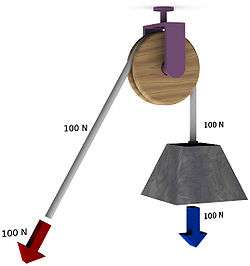pulley
See also: Pulley
English

A fixed pulley assembly
Etymology
From Middle English polley, pullie, from Old French poulie, polie (“a pulley, windlass”), (compare Medieval Latin polea, polegia, polegium; Middle Dutch puleye), of Germanic origin, from or related to Middle Low German pulen (“to pull”), Old English pullian (“to pull”) [1][2][3]. More at pull.
Pronunciation
- IPA(key): /ˈpʊli/
Audio (US) (file) - Rhymes: -ʊli
Noun
pulley (plural pulleys)
- One of the simple machines; a wheel with a grooved rim in which a pulled rope or chain will lift an object (more useful when two or more pulleys are used together, as in a block and tackle arrangement, such that a small force moving through a greater distance can exert a larger force through a smaller distance).
Translations
one of simple machines
|
|
References
- Skeat, An Etymological Dictionary of the English Language, "pulley".
- Diez, An Etymological Dictionary of the Romance Languages, "pulley".
- Century Dictionary and Cyclopedia, "pulley".
This article is issued from
Wiktionary.
The text is licensed under Creative
Commons - Attribution - Sharealike.
Additional terms may apply for the media files.